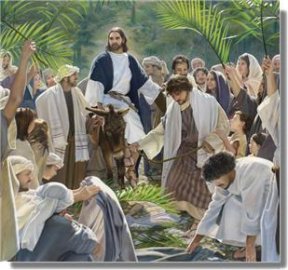Difference between revisions of "Hosanna Shout"
(→Historical Roots of the Hosanna Shout) |
(→Historical Roots of the Hosanna Shout) |
(No difference)
| |
Latest revision as of 20:19, 13 May 2020
The Hosanna Shout is a sacred salute members of The Church of Jesus Christ of Latter-day Saints (often inadvertently called the Mormon Church) offer at very special occasions. In modern times, it is most often given at the dedication of new church temples and solemn assemblies. Former church president Gordon B. Hinckley described it as a sacred salute to God and Jesus Christ. The Hosanna Shout is given following the dedicatory prayer at temple dedications. Those who wish to participate are invited to stand. They take a clean white handkerchief in their right hand, holding it by the corner. They wave the handkerchief or their hands and say, ““Hosanna, Hosanna, Hosanna to God and the Lamb.” This is said three times and is followed by “Amen, Amen, and Amen.” Those who do not wish to participate remain quietly seated.
The Hosanna Shout was given in commemoration of Joseph Smith’s First Vision of the Father and the Son at the Sunday morning session of April 2020 General Conference. President Russell M. Nelson, who presented the shout, said "We felt that it would be appropriate to rejoice together by participating in the Hosanna Shout." He also noted that the "[Hosanna Shout] also reaffirms what young Joseph experienced that day in the Sacred Grove—namely, that the Father and the Son are two glorified Beings, whom we worship and praise."[1]
Historical Roots of the Hosanna Shout
It is unknown when the Hosanna Shout was first instituted, although it has its roots in biblical tradition. At the Feast of the Tabernacles, the priests recited Psalm 118:25 as they marched around the Tabernacle. On the seventh day, the priests recited it seven times and those witnessing it waved palms, myrtles, and willows. They shouted Hosanna repeatedly, and that day was known as the Great Hosanna. Over time, the prayerful nature of the shout became associated with joyous shouting.
A similar ceremony occurred during the Lord Jesus Christ’s triumphal return to Jerusalem, as is shown in Matthew 21:9, 15. In modern times, a revelation for Martin Harris given through Joseph Smith, first modern prophet of The Church of Jesus Christ of Latter-day Saints, said:
- And speak freely to all; yea, preach, exhort, declare the truth, even with a loud voice, with a sound of rejoicing, crying—Hosanna, hosanna, blessed be the name of the Lord God! (Doctrine and Covenants 19:37).
This was given prior to the formal organization of the Church. Over the next several years, the Hosanna Shout was practiced, but it was the dedication of the Kirtland, Ohio, temple that made it an ongoing practice for the Church. It was addressed in the dedicatory prayer on that occasion in 1836. (See Joseph Smith Papers.)
- And also this church, to put upon it thy name. And help us by the power of thy Spirit, that we may mingle our voices with those bright, shining seraphs around thy throne, with acclamations of praise, singing Hosanna to God and the Lamb! And let these, thine anointed ones, be clothed with salvation, and thy saints shout aloud for joy. Amen, and Amen (Doctrine and Covenants 109:79–80).
The Hosanna Shout allows for an outlet of great religious feeling and is also a symbolic way of welcoming the Savior to the proceedings and remembering the atonement.
- The Hosanna Shout is whole-souled, given to the full limit of one’s strength. The congregation stands and in unison shouts the words ‘Hosanna, Hosanna, Hosanna to God and the Lamb. Amen, Amen, and Amen,’ repeating them three times. This is usually accompanied by the rhythmic waving of white handkerchiefs with uplifted hands. The epithet ‘Lamb’ relates to the condescension and atonement of Jesus Christ (in Daniel H. Ludlow, ed., Encyclopedia of Mormonism, 5 vols. [1992], 2:659).[2]
The Hosanna Shout is traditionally followed by the congregation singing "The Spirit of God."[3]
Sources:
- Gordon B. Hinckley, "This Great Millennial Year", October 2000 General Conference
- Reed Durham, "What is the Hosanna Shout?," New Era, September 1973
